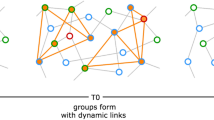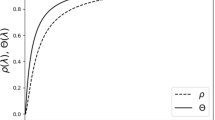Abstract
The spreading of an epidemic depends on the connectivity of the underlying host population. Because of the inherent difficulties in addressing such a problem, research to date on epidemics in networks has focused either on static networks, or networks with relatively few rewirings per timestep. Here we employ a simple, yet highly non-trivial, model of dynamical grouping to investigate the extent to which the underlying dynamics of tightly-knit communities can affect the resulting infection profile. Individual realizations of the spreading tend to be dominated by large peaks corresponding to infection resurgence, and a generally slow decay of the outbreak. In addition to our simulation results, we provide an analytical analysis of the run-averaged behaviour in the regime of fast grouping dynamics. We show that the true run-averaged infection profile can be closely mimicked by employing a suitably weighted static network, thereby dramatically simplifying the level of difficulty.
Access this chapter
Tax calculation will be finalised at checkout
Purchases are for personal use only
Preview
Unable to display preview. Download preview PDF.
Similar content being viewed by others
References
Keeling, M.J., Rohani, P.: Modeling Infectious Diseases in Humans and Animals. Princeton University Press, New York (2007)
Pastor-Satorras, R., Vespignani, A.: Epidemic dynamics in finite size scale-free networks. Phys. Rev. E 65, 035108–035112 (2002)
Petermann, T., Rios, P.D.L.: The role of clustering and gridlike ordering in epidemic spreading. Phys. Rev. E 69, 066116 (2004)
Watts, D.J., Muhamad, R., Medina, D.C., Dodds, P.S.: Multiscale, resurgent epidemics in a hierarchical metapopulation model. Proc. Natl. Acad. of Sci. 102, 11157–11162 (2005)
Gross, T., Dommar, C., Blasius, B.: Epidemic dynamics on an adaptive network. Phys. Rev. Lett. 96, 20–23 (2006)
Gross, T., Blasius, B.: Adaptive Coevolutionary Networks: A Review. J. R. Soc. Interface 5, 259–271 (2008)
Colizza, V., Vespignani, A.: Invasion threshold in heterogenous metapopulation networks. Phys. Rev. Lett. 99, 148701–148705 (2007)
Shaw, L.B., Schwartz, I.B.: Noise induced dynamics in adaptive networks with applications to epidemiology. E-print arXiv:0807.3455 on xxx.lanl.gov
Gueron, S., Levin, S.A.: The dynamics of group formation. Mathematical Biosciences 128, 243–246 (1995)
Gonzalez, M.C., Hidalgo, C.A., Barabási, A.-L.: Understanding individual human mobility pattens. Nature 453, 779–782 (2008)
Eguíluz, V.M., Zimmermann, M.G.: Transmission of information and herd behaviour: an application to financial markets. Phys. Rev. Lett. 85, 5659–5662 (2000)
McDonald, M., Suleman, O., Williams, S., Howison, S., Johnson, N.F.: Impact of unexpected events, shocking news, and rumors on foregin exchange market dynamics. Phys. Rev. E 77, 046110–046122 (2008)
Johnson, N.F., Jefferies, P., Hui, P.M.: Financial Market Complexity. Oxford University Press, Oxford (2003)
Zhao, Z., Calderon, J.P., Xu, C., Hui, P.M., Johnson, N.F.: (in preparation)
Sornette, D., Deschâtres, F., Gilbert, T., Ageon, Y.: Endogenous Versus Exogenous Shocks in Complex Networks: An Empirical Test Using Book Sale Rankings. Phys. Rev. Lett. 93, 228701 (2004)
Author information
Authors and Affiliations
Editor information
Editors and Affiliations
Rights and permissions
Copyright information
© 2009 ICST Institute for Computer Science, Social Informatics and Telecommunications Engineering
About this paper
Cite this paper
Zhao, Z., Zhao, G., Xu, C., Hui, P.M., Johnson, N.F. (2009). Strong Dependence of Infection Profiles on Grouping Dynamics during Epidemiological Spreading. In: Zhou, J. (eds) Complex Sciences. Complex 2009. Lecture Notes of the Institute for Computer Sciences, Social Informatics and Telecommunications Engineering, vol 4. Springer, Berlin, Heidelberg. https://doi.org/10.1007/978-3-642-02466-5_96
Download citation
DOI: https://doi.org/10.1007/978-3-642-02466-5_96
Publisher Name: Springer, Berlin, Heidelberg
Print ISBN: 978-3-642-02465-8
Online ISBN: 978-3-642-02466-5
eBook Packages: Computer ScienceComputer Science (R0)




